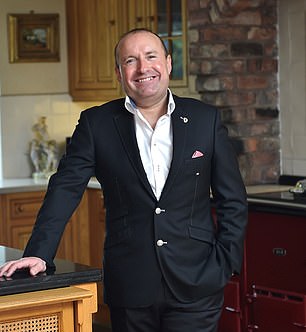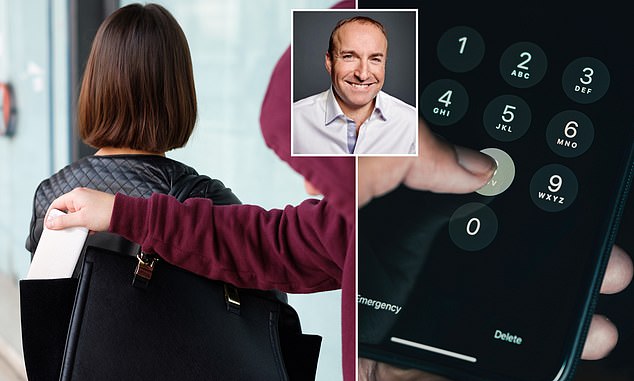Table of Contents
The secrets of the phone thieves terrorizing Britain’s streets have been revealed in a sensational interview between a gang leader and Dave Fishwick, the businessman who inspired the hit film Bank of Dave and the This is Money columnist. .
In the interview, which will be televised on ITV’s Good Morning Britain from 6am this morning (June 25), Dave questions the anonymous criminal who sends teams of youths onto the streets every day to steal phones.
Gang members earn up to £2,500 each a day, he reveals, while the leader can earn between £15,000 and £20,000.
Crime wave: Phones stolen, then banking apps hacked to get cash
But the criminal is not interested in the devices themselves. The name of the game is to gain access to victims’ banking apps and steal as much of their money as possible before the accounts are locked or frozen.
It’s part of the crime epidemic sweeping the country, so known because criminals approach their unsuspecting victims from behind, hoping to get their hands on their device while it’s unlocked or to see them enter passwords to their phone and banking app. .
Fishwick’s interview reveals the huge sums of money the gangs make, with leader Rich (whose name has been changed and his identity disguised) claiming that just one of his workers can steal up to £20,000 in cash a day.
How does the phone theft operation work?
The leader of the gang says that he has around eight young people working for him, who normally go out in teams of two.
They often ride a moped or electric scooter, in which case they snatch phones from victims’ hands on the side of the road. They will expect the phones to be unlocked, which means they will have full access.

Interrogation: Dave Fishwick grilled phone thief gang leader on Good Morning Britain
It is also common for Internet users to walk up to a crowded place, such as a bar, a music festival or a sporting event, so they can see the phone’s access code before picking it up.
“If a phone is stolen, it’s gone,” Rich says in the interview. “Out of your back pocket, into a club or a pub and disappear.”
“I have my little team, they go and bring me phones and I buy them from them.”
‘They’re going to bring them back to you and what do you do then?’ —Dave asks.
Rich replies: ‘You don’t have to bring them to me. They just have to call me and say: “I have these phones”, give me the numbers, the details and if they have money on the phones, they send it to my account details.’
Once thieves have the phones, they scan them for financial apps and access as many as they can, often changing passwords and email addresses so the phone’s owner is locked out.
They will either return the details to Rich and allow him to drain the money, or they will do it themselves and pass the money on to him.
‘The kids now know what they have to do, they have to look at certain apps and see if they can change certain passwords, they give me the account numbers or how much they have on the account and I’ll give them the account number to send it,’ he explained the leader of the gang.
Teenagers earning THOUSANDS per day
On a typical day, each member of his “team” can steal between 18 and 20 phones and earn Rich between £15,000 and £20,000.
It depends on how much money they can make from the phones, but their typical “salary” for the day will be around £5,000 for a team of two, a figure Dave describes as “unbelievable”.
‘A child goes out on his moped with his partner and brings three or four phones and then they go out again, three or four phones and they go out again and there are like fifteen phones. on a bike,” says Rich.
When Dave asks how young people manage to spend £2,500 in a single day, Rich’s response is: “Mopeds, bicycles, clothes, girls, drinks, food.
Good Morning Britain will also speak to a victim of shoulder surfing on the show about the impact it has had on them.
How This is Money has warned about phone thefts
This is Money has also highlighted stories of readers who had their phones snatched by thieves and then emptied their bank accounts.
In one case, a young reader had £3,900 taken from their Revolut account after their phone was taken during a night out – money that was only refunded by the finance app after our intervention. Another reader had £2,050 taken from them in a similar situation.
Last month, Santander’s fraud chief warned clients about the practice of shoulder surfing and gave advice on how to prevent it.
Watch the full interview with Dave Fishwick on Good Morning Britain from 6am Tuesday 25 June on ITV1, ITVX, STV and STV Player.
SAVE MONEY, MAKE MONEY

Savings offers

Savings offers
Higher rates plus £50 bonus until July 15

Isa cash at 5.17%

Cash Isa at 5.17%
Includes 0.88% bonus for one year

free share offer

free share offer
No account fee and free stock trading
5.78% savings
5.78% savings
has 365 days notice

Fiber broadband

Fiber broadband
£50 BT Reward Card: £30.99 for 24 months
Affiliate links: If you purchase a This is Money product you may earn a commission. These offers are chosen by our editorial team as we think they are worth highlighting. This does not affect our editorial independence.
Some links in this article may be affiliate links. If you click on them, we may earn a small commission. That helps us fund This Is Money and keep it free to use. We do not write articles to promote products. We do not allow any commercial relationship to affect our editorial independence.

